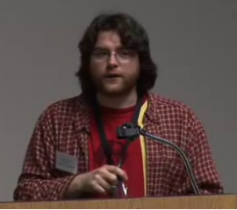A Quote by Michael Demon Calce
Where there's a will, there's a way. Hackers tend to find a way. Code is also expanding. More lines of code means more probability that there is an exploit that can be [used].
Related Quotes
The security world needs to take a more proactive approach. A lot of companies will know an exploit exists and they'll release the software anyways, and the patch later on. Stuff like this needs to stop. There needs to be some kind of agency that verifies code before it's released, maybe a grading system for code.
When the words are fuzzy, the programmers reflexively retreat to the most precise method of articulation available: source code. Although there is nothing more precise than code, there is also nothing more permanent or resistant to change. So the situation frequently crops up where nomenclature confusion drives programmers to begin coding prematurely, and that code becomes the de facto design, regardless of its appropriateness or correctness.
You can use the tax code to make people smoke less. You can use the tax code to make 'em smoke more. You can use the tax code to make 'em buy beer or buy less beer, more booze or less booze. You can screw the tax code around to make 'em make more charitable contributions. You think they're going to get rid of this power? Ain't no way, fool.
There is nothing more personal than your values. What you will and won't do to get ahead, the lines you will and won't cross to win, whom you will and won't step on for personal gain, are at the very core of your code of honor. And your code of honor determines your character. And your character is who you are. Behind closed doors. When nobody is watching.
My favorite method of encryption is chunking revolutionary documents inside a mess of JPEG or MP3 code and emailing it off as an "image" or a "song." But besides functionality, code also possesses literary value. If we frame that code and read it through the lens of literary criticism, we will find that the past hundred years of modernist and postmodernist writing have demonstrated the artistic value of similar seemingly arbitrary arrangements of letters.































